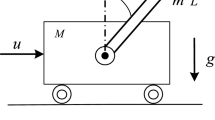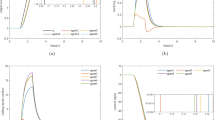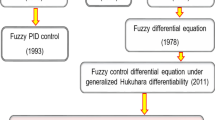Abstract
In this paper, a Lyapunov-based fuzzy logic control (FLC) system is developed for controlling of complicated as well as distinct nonlinear systems. According to Lyapunov Stability Theory, a candidate Lyapunov function with simple quadratic form is designed. Via constructing the fuzzy IF–THEN rules through referencing the statuses of errors states and error derivatives in each sub-space of the Lyapunov function derivatives, the proposed structure of FLC system is able to appropriately as well as flexibly adjust the control forces with minimum magnitude compensating the nonlinear systems in real-time. In addition, the designed FLC system can be applied to different kinds of control systems without further information and operation experience. Two nonlinear systems with distinct structures, classical Lorentz system and Mathieu-van der Pol system, are illustrated for simulation examples. In comparison of the previous research work, the simulation results reveal the effectiveness, flexibility and convenient-design of the proposed method.











Similar content being viewed by others
References
Lorenz EN (1963) Deterministic non-periodic flows. J Atoms 20:130–141
Yau HT, Wu SY, Chen CL, Li YC (2016) Fractional-order chaotic self-synchronization-based tracking faults diagnosis of ball bearing systems. IEEE Trans Ind Electron 63(6):3824–3833. https://doi.org/10.1109/TIE.2016.2522941
Gu FC, Yau HT, Chen HC (2019) Application of chaos synchronization technique and pattern clustering for diagnosis analysis of partial discharge in power cables. IEEE Access 7:76185–76193
Li SY, Gu KR (2020) A smart fault-detection approach with feature production and extraction processes. Inf Sci 513:553–564
Li SY, Gu KR (2019) Smart fault-detection machine for ball-bearing system with chaotic mapping strategy. Sensor 19(9):1–16
Nicolis JS (1985) Chaotic dynamics of information processing: the “magic number seven plus-minus two” revisited. Bull Math Biol 47(3):343–365
Jovic B, Unsworth CP, Sandhu GS, Berber SM (2007) A robust sequence synchronization unit for multi-user DS-CDMA chaos-based communication systems. Signal Process 87:1692–1708
Li SY, Hernández MAB, Tam LM, Chen CS (2019) A cloud image data protection algorithm with multi-level encryption scheme and automated- selection mechanism. Appl Sci 9(23):5146–5163
Zhang L, Zhang Y, Huang T, Ma H (2019) Prescribed performance cooperative control for multiagent systems with input quantization. IEEE Trans Fuzzy Syst. https://doi.org/10.1109/TCYB.2019.2893645
Du Z, Kao Y, Park JH (2019) Interval type-2 fuzzy sampled-data control of time-delay systems. Inf Sci 487:193–207
Zadeh LA (1998) Fuzzy logic. IEEE Comput 21(1):83–93
Takagi T, Sugeno M (1985) Fuzzy identification of systems and its applications to modeling and control. IEEE Trans Syst Man Cybern 15(1):116–132
Li SY, Ge ZM (2011) Fuzzy modeling and synchronization of two totally different chaotic systems via novel fuzzy model. IEEE Trans Syst Man Cybern Part B Cybern 41(4):1015–1026
Li SY, Tam LM, Tsai SE, Ge ZM (2016) Novel fuzzy modeling and synchronization of chaotic systems with multinonlinear terms by advanced Ge-Li fuzzy model. IEEE Trans Cybern 46(10):2228–2237
Li H, Wang J, Shi P (2016) Output-feedback based sliding mode control for fuzzy systems with actuator saturation. IEEE Trans Fuzzy Syst 24(16):1282–1293
Du P, Liang H, Zhao S, Ahn CK (2019) Neural-based decentralized adaptive finite-time control for nonlinear large-scale systems with time-varying output constraints. IEEE Trans Syst Man Cybern. https://doi.org/10.1109/tsmc.2019.2918351
Zhang L, Liang H, Sun Y, Ahn CK (2019) Adaptive event-triggered fault detection scheme for semi-markovian jump systems with output quantization. IEEE Trans Syst Man Cybern. https://doi.org/10.1109/tsmc.2019.2912846
Zhang ZH, Yang GH (2018) Interval observer-based fault detection in finite frequency domain for discrete-time fuzzy systems. Neurocomputing 30:38–45
Zhang L, Lam HK, Sun Y, Liang H (2019) Fault detection for fuzzy semi-markov jump systems based on interval type-2 fuzzy approach. IEEE Trans Fuzzy Syst. https://doi.org/10.1109/TFUZZ.2019.2936333
Li H, Wang J, Wu L, Lam HK, Gao Y (2018) Optimal guaranteed cost sliding mode control of interval type-2 fuzzy time-delay systems. IEEE Trans Fuzzy Syst 26(1):246–257
Li H, Wang J, Du H, Karim HR (2018) Adaptive sliding mode control for Takagi-Sugeno fuzzy systems and its applications. IEEE Trans Fuzzy Syst 26(2):531–542
Li Y, Ma Z, Tong S (2018) Adaptive fuzzy fault-tolerant control of nontriangular structure nonlinear systems with error constraint. IEEE Trans Fuzzy Syst 26(4):2062–2074
Tam LM, Chen HK, Li SY (2018) Adaptive synchronization of complicated chaotic systems with uncertainties via fuzzy modeling-based control strategy. Inf Sci 47:18–31
Li SY, Chen HK, Tam LM, Huang SC, Ge ZM (2014) Pragmatical adaptive synchronization—new fuzzy model of two different and complex chaotic systems by new adaptive control. Inf Sci 277:458–480
Li H, Sun X, Wu L, Lam HK (2015) State and output feedback control of interval type-2 fuzzy systems with mismatched membership functions. IEEE Trans Fuzzy Syst 23(6):1943–1957
Wang T, Tong S (2018) Observer-based fuzzy adaptive optimal stabilization control for completely unknown nonlinear interconnected systems. Neurocomputing 313:415–425
Wang H, Zou Y, Liu PX, Liu X (2018) Robust fuzzy adaptive funnel control of nonlinear systems with dynamic uncertainties. Neurocomputing 314:299–309
Li SY, Hernández MAB (2019) Robust synchronization of chaotic systems with novel fuzzy rule-based controllers. Inf Sci 481:604–615
Lee J (1993) On methods for improving performance of PI-type fuzzy logic controllers. IEEE Trans Fuzzy Syst 1(4):298–301
Zhao X, Lin C, Chen B, Wang QG (2018) A novel Lyapunov–Krasovskii functional approach to stability and stabilization for T–S fuzzy systems with time delay. Neurocomputing 313:288–294
Li Y, Sun K, Tong S (2019) Observer-based adaptive fuzzy fault-tolerant optimal control for SISO nonlinear systems. IEEE Trans Cybern 49(2):649–661
Wu D, Chen M, Gong H (2018) Adaptive neural flight control for an aircraft with time-varying distributed delays. Neurocomputing 307:130–145
Li H, Pan Y, Shi P, Shi Y (2016) Switched fuzzy output feedback control and its application to a mass–spring–damping system. IEEE Trans Fuzzy Syst 24(6):1259–1269
Dong G, Li Y, Sui S (2018) Fault detection and fuzzy tolerant control for complex stochastic multivariable nonlinear systems. Neurocomputing 275:2392–2400
Li Y, Tong S, Li T (2012) Adaptive fuzzy output feedback control of MIMO nonlinear uncertain systems with time-varying delays and unknown Backlash-like hysteresis. Neurocomputing 92:56–66
Yau HT, Shieh CS (2008) Chaos synchronization using fuzzy logic controller. Nonlinear Anal Theory Methods Appl 9(4):1800–1810
Li SY, Ge ZM (2011) Generalized synchronization of chaotic systems with different orders by fuzzy logic constant controller. Expert Syst Appl 38(3):2302–2331
Li SY (2011) Chaos control of NEW Mathieu–Van der Pol systems by fuzzy logic constant controllers. Appl Soft Comput 11(8):4474–4487
Ge ZM, Li SY (2009) Chaos control of new Mathieu–Van der Pol systems with new Mathieu-Duffing systems as functional system by GYC partial region stability theory. Nonlinear Anal Theory Methods Appl 71(9):4047–4059
Acknowledgements
This study was funded in part by the Ministry of science and Technology, Taiwan, with Grant Nos. MOST 107-2628-E-027-003-MY3, MOST 108-2221-E-027-094, and funded in part by Institute for the Development and Quality, Macau.
Author information
Authors and Affiliations
Corresponding author
Additional information
Publisher's Note
Springer Nature remains neutral with regard to jurisdictional claims in published maps and institutional affiliations.
Rights and permissions
About this article
Cite this article
Li, SY., Tam, LM., Chen, HK. et al. A novel-designed fuzzy logic control structure for control of distinct chaotic systems. Int. J. Mach. Learn. & Cyber. 11, 2391–2406 (2020). https://doi.org/10.1007/s13042-020-01125-3
Received:
Accepted:
Published:
Issue Date:
DOI: https://doi.org/10.1007/s13042-020-01125-3




